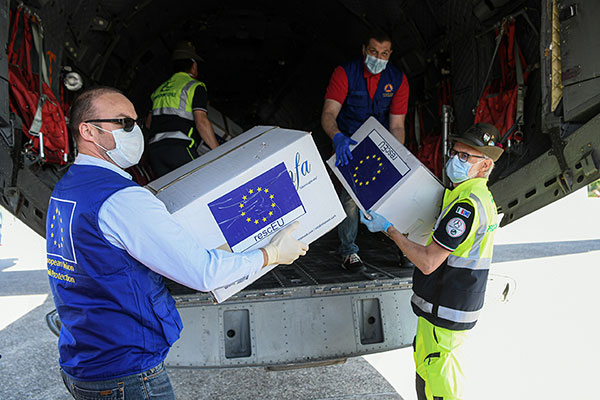10 things the EU is doing to fight the coronavirus

date: 06/05/2020
1. Supporting the economy
The EU is putting forward a EUR 540 billion package to support workers, businesses and EU countries.
The European Central Bank - the central bank of the 19 EU countries using the euro - is also providing EUR 750 billion to relieve national government debt during the crisis.
The EU is making sure that EU countries can support their healthcare systems and businesses, and keep workers in employment during the crisis. They are also relaxing state aid rules and fiscal policy so that governments can make immediate investments.
2. Protecting jobs
The EU is making available EUR 37 billion from the EU’s structural funds - normally used to combat regional inequalities - to EU countries to enable them to respond to the crisis.
To help protect workers from the risk of unemployment and loss of income, the EU is working to create temporary assistance (SURE) of up to EUR 100 billion to support national measures.
3. Helping the EU’s recovery
EU leaders have set out a comprehensive plan to help the EU recover from the economic and social impact of the pandemic in the years to come.
They have agreed to work on an 'EU recovery fund' and asked the European Commission to propose a new EU budget for 2021-2027 to support EU citizens, businesses and countries to recover from the crisis.
4. Boosting European solidarity
EU countries are sending medical teams to support each other, take on patients from other countries, and send equipment to those most in need.
The EU is facilitating the dispatch of medical teams from different countries through the EU Medical Corps to support the health care services hardest hit by the crisis. The first team to leave was a Romanian group of doctors and nurses who helped out in Lecco, Italy.
In the spirit of solidarity, EU countries have come to one another’s aid.
For example, Austria, Germany and Luxembourg have made their intensive care units available to critically ill Dutch, French and Italian patients. Poland, Romania and Germany have sent teams of doctors to help treat patients in hospitals in Italy. Denmark is sending ventilators and hospital equipment to Italy.
EU countries will also be able to use up to EUR 800 million from the EU Solidarity Fund to finance health emergencies. Italy was the first country to ask for support.
5. Slowing the spread of the virus
To limit the transmission of the virus in Europe and beyond, the EU has closed its external borders for all non-essential travel to the EU, while ensuring that essential goods and essential cross-border workers keep moving.
6. Providing medical equipment
EU countries have speedy access to the first ever ‘RescEU stockpile’ of medical equipment, such as ventilators and protective masks. For example, 90 000 masks have been delivered to Italy for distribution to healthcare staff.
The EU has launched four large international tenders allowing countries to make joint purchases of equipment and testing kits.
7. Promoting research for a vaccine
The EU is funding 18 research projects and 151 teams across Europe to help find effective treatments, better ways to test, and a vaccine for Coronavirus.
The EU also joined forces with the World Health Organisation and other global health partners to organise a worldwide pledging event to raise EUR 7.5 billion to fund research for a vaccine.
8. Repatriating EU citizens
More than 50 000 Europeans stranded around the world by the outbreak have been brought home thanks to the EU civil protection mechanism.
As of mid-April 2020, the repatriation efforts of individual countries, combined with EU support, had helped more than 650 000 Europeans abroad, and more than half a million citizens had been brought home.
9. Supporting countries around the globe
The EU has set out plans to support countries outside the EU in fighting the virus and to provide EUR 20 billion to address the health crisis and humanitarian needs.
The EU has also supported the freezing of debt for developing countries, thereby freeing up resources to be spent on fighting the pandemic.
10. Fighting disinformation
The EU is helping to fight disinformation by providing accurate, up-to-date information. It is working with online platforms to promote reliable sources, debunk fake news and remove illegal content. You can also play a role: think before sharing!
Full overview of the EU’s response to Coronavirus
